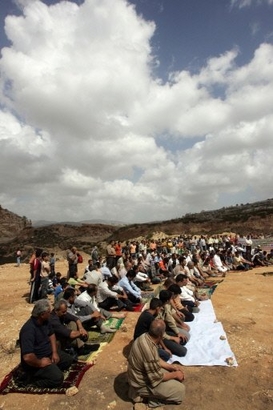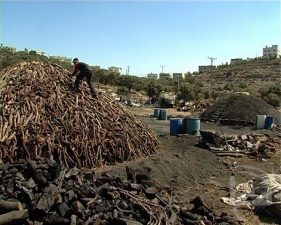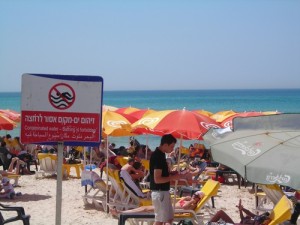Events over the past week indicate that Palestinian surface and ground water resources are in great danger.
Last Friday, around three hundred Palestinians protested the reopening of an Israeli dump site near the West Bank village of Deir Sharaf, outside Nablus. The dump, which was closed several years ago, may pose a grave threat to local underground water resources.
Until 2005, the Deir Sharaf site served as a dumping ground for solid waste from Israeli towns and West Bank settlements. The site was closed in 2005 because Palestinians protested that the dumping polluted their underground wells.
There are five artesian wells in the area around the dump site. According to Mohammed Abu Safat, a geologist at al-Najah University in Nablus, dumping waste at the Deir Sharaf site could endanger the water resources on which tens of thousands of Palestinians depend.
Although Israeli authorities indicate that no decision has been made, Israeli work crews have recently returned to the area, sparking fear that the site may reopen.
The Deir Sharaf protests come on top of an alarming report published last week on the contamination of streams in the West Bank. Israel’s Environmental Protection Ministry, the Civil Administration, and the Israeli Nature and National Parks Service announced that 58 million cubic meters of untreated wastewater is being pumped into streams in the West Bank.
The report found that the main problem is a lack of proper infrastructure. Palestinian cities and villages in the West Bank, such as Hebron, Ramallah, Nablus, and Jenin lack infrastructure to treat wastewater sufficiently. Their waste is either pumped to sewage pits or local treatment facilities, where there is little to no treatment before the water is discharged into the environment.
Additionally, the report found Israeli settlements over the Green Line to be environmentally problematic. About 30% of these communities, including illegal outposts and unauthorized settlement expansions, are not connected to sewage treatment infrastructure. Their wastewater is pumped into sewage pits, which easily seep into local water systems.
There is currently little cooperation between Israeli and Palestinian authorities on infrastructure and waste treatment.
:: AFP – Hundreds protest Israeli plan to dump waste in West Bank
:: YnetNews – Report: Palestinian effluent endangers underground reservoirs
Photos: AFP and Washington Times
For related Prophecies, check out A Green Prophet Finds West Bank in Water Crisis Too! or Why is the Society for the Protection of Nature in Israel Supporting Settlements in the West Bank?





